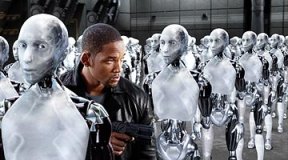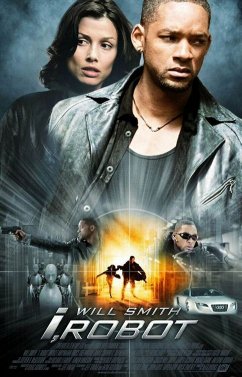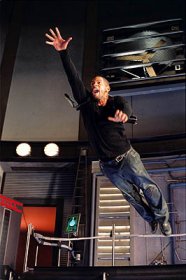|
I,
Robot
In
the future, we will have robots doing all our manual labor
for us. The poor will still be with us, but for some reason,
they'll be really happy about having nothing to do. ("A
HA!" scream the Republicans.) Thankfully, there will also
still be Big Willy Style.
I,
Robot actually cuts down on the usual Will Smith shenanigans,
as he really does try to subsume himself in the role of
Del Spooner, a Chicago homicide detective. Occasionally
he still breaks out that smile and the half-mumbled one-liners,
but he also goes through the movie with an expression of
buried pain on his face that would work if the script had
actually fleshed out his problem with robots. Everywhere
he goes, he gets accused of bigotry toward our mechanical
friends. Perhaps you might find some sort of social statement
there, but screenwriter Akiva Goldsman has trouble with
subtext. Perhaps the earlier draft by Jeff Vintar was stronger.
Still,
under the direction of Alex Proyas, the film moves and looks
better than it has a right to be. So loosely adapted from
Isaac Asimov's short story collection that it has little
more than a title in common, it's a decent pulse-pounder
with a peculiar aftertaste. And at least they named the
cat Asimov in tribute, even if they quickly throw that plot
element away.
Set
just thirty years into our future, I, Robot posits
a society not too different from our own, except for the
robots. They're everywhere, walking dogs, baking pies, doing
heavy lifting and all the other things we usually delegate
to our kids. The most common robot design looks like a Crash
Test Dummy, a sensible design when you think about it. But
U.S. Robotics (don't they make modems?) is all ready to
launch a new line, the NS-5, that takes the dummy look and
ups it into a Steve Jobs wet dream.
On
the eve of the launch, their star designer, Dr. Alfred Lanning
(James Cromwell) commits suicide - Or did he? (Lanning,
by the way, was born in 1971 and thus, disturbingly, is
younger than this reviewer and possibly anybody else who
might care that this movie has so little to do with the
Asimov book.)
Lanning
and Spooner had a connection which forms some little bit
of suspense. That connection also supposedly goes toward
explaining Spooner's cyberbigotry. And yet - once it's revealed,
almost every scene makes a big deal out of it, thus making
Spooner seem like a chump in the first half.
However,
you can understand his unease with robots, especially the
NS-5s. Proyas stages a scene in a robot factory that does
make them seem terribly menacing. Especially when asked
to identify a fugitive robot, Sonny (Alan Tudyk) - they
chant "one of us" in a manner most creepy.
I'll
give Proyas this; in trailers, the robots seemed unimpressive,
but in the context of the whole film, their sheer numbers
and implacability really do work to create tension. And
Tudyk's voice work as Sonny is nothing short of brilliant,
a far cry from his equally brilliant work earlier this summer
as Steve the Pirate in Dodgeball.
Combined with the CG, it creates a robot believably constrained
by the three laws of robotics and yet built to get around
them; he has a moral dilemma as he struggles to learn what
it means to be human.
 |
That
element makes this a perfect match for Proyas. In both The
Crow and Dark City, the director wrestled with
the question of what makes us who we are, and it runs through
I, Robot quite subtly. But the script careens from
think piece to action thriller, and thus undoes its more
delicate points. Who cares what makes a human being when
you have to find an excuse for explosions and swarms of
robots? And when you've got at least one major character,
Dr. Susan Calvin (Bridget Moynihan), so robotic that you
keep expecting her to rip off a rubber mask and scream,
"no, I robot!" Actually, that would have been cool.
Proyas tacks on an ending to try to bring it back around,
but it's too ambiguous and unsatisfying.
The
movie also really doesn't explore the ramifications of the
robot-filled society. When the chips are down, the lower
classes are ready with their torches and pitchforks, but
you have to wonder what they were doing until then. It seems
that in 2035, the only viable jobs left are computer programmers,
businessmen and cops.
Yipes.
The future is here.
Rating:

|








